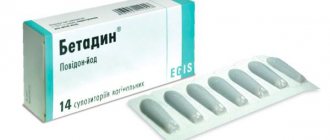Indomethacin suppositories instructions for use in gynecology
Rectal suppositories
are white with a yellowish or creamy tint, torpedo-shaped, with a weak specific odor.
5 pieces. — contour cell packaging (2) — cardboard packs.
NSAIDs, a derivative of indoleacetic acid. It has anti-inflammatory, analgesic and antipyretic effects. The mechanism of action is associated with inhibition of the COX enzyme, which leads to inhibition of the synthesis of prostaglandins from arachidonic acid.
Suppresses platelet aggregation.
When administered orally and parenterally, it helps to relieve pain, especially pain in the joints at rest and during movement, reduce morning stiffness and swelling of the joints, and increase the range of movements. The anti-inflammatory effect develops by the end of the first week of treatment.
When applied topically, it eliminates pain, reduces swelling and erythema.
When used externally, it also helps reduce morning stiffness and increase range of motion.
After oral administration, indomethacin is rapidly absorbed from the gastrointestinal tract. Cmax in plasma is reached after 2 hours. Metabolized in the liver. Subject to enterohepatic recirculation. Indomethacin is determined in the blood plasma in the form of unchanged substance and unbound metabolites - desmethyl, desbenzoyl, desmethyl-desbenzoyl.
T1/2 is about 4.5 hours. It is excreted in the urine - 60% in the form of unchanged substance and metabolites, and in feces - 33% mainly in the form of metabolites.
For systemic use: articular syndrome (including rheumatoid arthritis, osteoarthritis, ankylosing spondylitis, gout), spinal pain, neuralgia, myalgia, traumatic inflammation of soft tissues and joints, rheumatism, diffuse connective tissue diseases, dysmenorrhea. As an adjuvant for infectious and inflammatory diseases of the ENT organs, adnexitis, prostatitis, cystitis.
For local use: prevention of the inflammatory process during surgery for cataracts and on the anterior segment of the eye, inhibition of miosis during surgery.
For external use: articular syndrome (including rheumatoid arthritis, osteoarthritis, ankylosing spondylitis, gout), spinal pain, neuralgia, myalgia, traumatic inflammation of soft tissues and joints.
They are set individually, taking into account the severity of the disease. For adults, when taken orally, the initial dose is 25 mg 2-3 times a day. If the clinical effect is insufficient, the dose is increased to 50 mg 3 times a day. Long-acting dosage forms are used 1-2 times a day. Maximum daily dose: 200 mg.
When the effect is achieved, treatment is continued for 4 weeks at the same or reduced dose. With long-term use, the daily dose should not exceed 75 mg. Take after meals.
For the treatment of acute conditions or relief of exacerbation of a chronic process, 60 mg is administered intramuscularly 1-2 times a day. The duration of intramuscular administration is 7-14 days. Then indomethacin is administered orally or rectally at 50-100 mg 2 times a day, with the maximum daily dose
should not exceed 200 mg. For maintenance treatment, use 50-100 mg rectally 1 time/day at night.
Dosage and methods of application
The maximum daily dosage of indomethacin is 0.20 g. It directly depends on the purpose of the drug.
Immediately before introducing suppositories into the intestines, it is necessary to empty it. Daily dosage is no more than 3 times a day, 0.05 g or 0.10 g before bedtime. The treatment period depends on the disease being treated.
When using the drug vaginally, you must wash before administration. The dosage depends on the direction of action. As a rule, suppositories are used for the following diseases:
- To eliminate menstrual pain, indomethacin suppositories are used before it begins or for the first time 1-2 days after the start of the cycle.
- For the treatment of cystitis, the dosage is up to 1-2 times a day. During an exacerbation, 3 times a day. To relieve acute pain, one-time use of suppositories will help.
- During the period of chronic inflammation or relief of an acute condition, use 1-2 suppositories of 0.05 g or 0.1 g, but not more than 0.2 g per day.
- For prevention, suppositories of 0.05 g or 0.1 g are used once before bedtime.
- Pregnant women with uterine hypertonicity use indomethacin suppositories rectally rather than vaginally.
Indications for use
Indomethacin suppositories are prescribed for the treatment of general and local inflammatory processes in gynecological and ENT diseases, neuralgia, protein metabolism disorders, tissue inflammation after injury, prostatitis, and diseases of the musculoskeletal system. Indomethacin-based suppositories are especially effective in the treatment of such ailments, accompanied by constant or periodic pain and high fever.
Rectal indomethacin is used for a wide range of diseases:
- gout;
- osteoporosis;
- rheumatoid arthritis;
- thrombophlebitis;
- pain in the spine;
- inflammation of bone tissue;
- Bekhterov's disease;
- periarthritis;
- myalgia;
- connective tissue inflammation;
- algodismenorrhea;
- endometriosis;
- cystitis;
- ovarian cyst;
- risk of miscarriage;
- fibroleiomyoma of the uterus;
- inflammation of the uterine appendages.
Interaction
- When combining this drug with beta-blockers and saluretics , a decrease in their effectiveness may be observed.
- When taken simultaneously with indirect anticoagulants , their effect is significantly increased.
- You should not prescribe drugs containing Indomethacin; together with Diflunisal, this can lead to the development of gastric bleeding.
- When used in combination with Probenecid, it is possible to enhance the drugs of the Indomethacin group.
- When combined with Cyclosporine, its toxicity sharply increases.
- If you use Digoxin and Indomethacin suppositories at the same time , it is possible to increase the concentration of Digoxin in the bloodstream, this leads to an increase in its effect.
Composition and mechanism of action of the drug
The active substance of the drug is the non-steroidal drug indomethacin. It has an anesthetic, antipyretic, anti-inflammatory effect. Thanks to its use, the patient’s attacks of pain are relieved, fever goes away, and inflammation is reduced. In addition to indomethacin, the drug contains two additional components: solid fat and corn starch.
Side effects
The active component of this medicine can cause serious side effects, such as internal bleeding, so suppositories containing indomethacin are not prescribed for hemorrhoids. An allergic reaction in the form of bronchospasms, urticaria, and angioedema can occur in asthmatics and people sensitive to allergens. Other side effects of indomethacin suppositories:
- increased blood pressure;
- insomnia;
- headache;
- diarrhea;
- drowsiness;
- noise in ears;
- irritability;
- hallucinations;
- dizziness.
How to use indomethacin suppositories rectally
Indications for the use of suppositories with indomethacin involve using the drug exactly as prescribed by the doctor.
Before using suppositories rectally, it is advisable to place them in the refrigerator until they become hard. How to use candles step by step:
- Remove packaging.
- Moisten the candles with water.
- Lie on your left side and raise your right knee. For left-handed people the opposite happens.
- Insert the suppository with your finger into the rectum approximately 2.5 cm deep.
- Continue lying down for 15 minutes. Try to refrain from bowel movements for 1 hour.
Contraindications
Being an effective anti-inflammatory agent, relieving pain and fever, indomethacin suppositories can provoke exacerbation of chronic ailments, so the medicine has a number of contraindications:
- liver diseases (failure, cirrhosis);
- internal bleeding;
- cardiac diseases (congenital defect, failure);
- high blood pressure;
- optic nerve disease;
- chronic renal failure;
- peptic ulcer.
This drug is contraindicated for pregnant women at certain stages of gestation. Indomethacin, which is included in suppositories during pregnancy, can provoke premature closure of the arterial (botallian) duct in the child. For this reason, the use of the medicine is allowed only from 16 to 32 weeks. Suppositories should not be used during breastfeeding, children under 14 years of age, or people prone to allergies or hypersensitivity to indomethacin.
Composition and properties of Indomethacin suppositories
Indomethacin is a non-steroidal drug. The drug has an anti-inflammatory, antipyretic, anti-edematous and analgesic effect on the body.
The active ingredient of the drug is indomethacin (a derivative of acetic acid). Its quantity in one candle varies (depending on the packaging) and is 50 or 100 ml. The auxiliary components are:
- solid fat;
- starch obtained from corn.
Suppositories are yellowish or white in color. After use, approximately 70% of the product leaves the body in urine. Everything else is excreted through the gastrointestinal tract.
Indomethacin-based medications are available in various forms. But in gynecology it is recommended to use suppositories because of their high speed of action on the body.
Indomethacin suppositories reduce pain within 10–15 minutes
Analogs
At the moment, analogues of indomethacin suppositories are available in pharmacies. Their cost varies and depends on the number of suppositories in the package and milligrams. Analogues of the drug include:
- Ketoprofen;
- Naproxen;
- Movimed;
- Diclofenac;
- Indobene;
- Methindol.
All of the listed analogues have the same effect as Indomethacin, but before use, be sure to read the instructions. Analogs may cost less, but before purchasing, you should make sure that the drug contains the required amount of active ingredient. The price of medicines depends on the manufacturer; for example, a drug from a foreign representative will cost more than a local one.
Interaction with other drugs
The drug should be used with caution with drugs such as:
- aspirin;
- paracetamol;
- cefoperazone: blood clots may appear;
- drugs containing ethanol, glucocorticosteroids, colchicine and diflunisal: the risk of complications in gastrointestinal diseases, as well as bleeding;
- antihypertensive drugs and diuretics: decrease in their effectiveness.
conclusions
If we take into account all the reviews about the drug, we can conclude that Indomethacin in the form of suppositories is an effective remedy. Moreover, the range of its actions is wide, the indications for use also exceed all expectations, but there are many contraindications. Before using it, it is important to take into account all contraindications so that unwanted side reactions do not occur later. Sometimes an adverse reaction can create more serious problems than the disease itself. Before use, you should definitely consult a specialist.
Read
Also:
- Suppositories for cystitis: which ones to choose?
- Terzhinan suppositories: instructions for use
- Klion D candles - instructions for use
- Livarol: instructions for use, analogues, reviews
- Pain-relieving rectal suppositories for pain
- The drug Indinol Forte: composition of tablets and analogues
Application in gynecology
Indomethacin suppositories have a wide spectrum of action. In gynecology, the drug is prescribed in the following cases:
- pain during menstrual periods (algodismenorrhea);
- bleeding and inflammation of female organs;
- cystitis - a disease of the bladder;
- ovarian cyst - a benign formation in the ovary;
- fibroleiomyoma - a benign formation in the uterus;
- endometriosis - degeneration of the tissues of the inner layer of the uterus, accompanied by pain;
- obstruction of pipes;
- adhesive process.
Contraindications
Suppositories should absolutely not be used for:
- epilepsy;
- depression;
- Parkinson's disease;
- allergies to aspirin;
- blood diseases;
- stomach ulcer;
- internal bleeding;
- sensitivity to the main substance;
- hearing loss;
- inflammation of the optic nerve;
- hypertension;
- bronchial asthma;
- severe pancreatitis;
- liver cirrhosis;
- hemophilia;
- hemorrhoids;
- proctitis;
- thrombocytopenia;
- pathologies of the vestibular apparatus;
- lack of glucose in the body.
In addition, Indomethacin is contraindicated in children and elderly women.
Possible side effects
Before using Indomethacin suppositories, you should carefully study the instructions for the drug, since the wrong dosage can cause side effects, in particular:
- From the nervous system:
- dizziness;
- lack of sleep;
- anxiety;
- headache;
- convulsions;
- fainting.
- From the gastrointestinal tract:
- flatulence;
- abdominal pain;
- constipation;
- diarrhea;
- bleeding.
- From the cardiovascular system:
- hypertension;
- feeling of pain in the chest area;
- tachycardia;
- heart failure.
In addition, allergic manifestations in the form of itching, burning and rash, as well as severe sweating, are possible. Sometimes there are impaired renal function, decreased hearing, and vision.
The occurrence of side effects from the first days of using the product is a serious reason to immediately visit a doctor and adjust the treatment regimen.
A decrease in concentration after using the product excludes operating machinery and driving a car. Side effects occur with much greater force in people who combine taking an anti-inflammatory drug with alcohol.
Properties
Suppositories can be used both rectally and vaginally (in women). This drug, penetrating into the bloodstream, inhibits the production of prostaglandin hormones.
Their production contributes to the development of inflammation and pain. Due to the good absorption of this drug, the therapeutic effect occurs quite quickly, within the first week from the start of use.
Unlike tablets, suppositories have a great advantage when using them. They are not exposed to acids and enzymes in the gastrointestinal tract, but enter directly into the bloodstream.
Features of the use of suppositories during pregnancy and lactation
The active substance of the drug passes unhindered through the placenta and causes pathologies in fetal development. Therefore, special attention is usually paid to the use of candles by expectant mothers or breastfeeding women.
- A gynecologist may cautiously prescribe the drug to pregnant women in the first and second trimesters in case of increased uterine tone, since Indomethacin does not allow the body to produce hormones that tone the muscles.
- It is better for nursing mothers to avoid treating inflammation with suppositories, as these suppositories are quite toxic. If for some reason this cannot be done, then the newborn should receive dry formula instead of breast milk.
Causes and consequences of muscle tone - video
special instructions
Special instructions for use:
- Candles may become too soft when left in a warm room, so they should be immersed in cold water or placed in the refrigerator before use. Only after this is it possible to use them.
- For ease of use, they can be moistened with water , this will facilitate deeper penetration into the lumen of the rectum.
- Before the procedure, it is necessary to cleanse the intestines using a microenema or a rubber bulb . When inserting a suppository, it is best to take a position lying on your left side. After inserting rectal suppositories, you need to lie down for 30 minutes, this will allow better absorption of the medicine.
- It is advisable to undergo a complete examination when using this medicine. If the patient has acute or chronic processes, then the doctor must be informed about this.
- In cases where pain appears in the intestines , or in the area of the prostate gland, which is accompanied by itching, it is best to discontinue the use of rectal suppositories. Or consult a doctor who will prescribe another drug or reduce the dose of the drug.
- When using suppositories, both rectally and vaginally, it is necessary to monitor the functioning of the kidneys and liver. With extreme caution, this drug is prescribed to patients suffering from cardiovascular pathologies, as well as diseases of the stomach and intestines, and to patients with ulcerative colitis.
- Extremely careful, the drug is prescribed in old age. This is explained by the fact that patients may experience side effects that are severe.
- After using candles, you must wash your hands thoroughly with soap and water. This will prevent this medication from getting into your eyes or mouth. If this does happen, you need to rinse your eyes under running water.
- During therapy with this medication, you should not drink alcoholic beverages . When they are combined, unpredictable side processes may develop. Alcohol may reduce the effectiveness of treatment with this drug.
- Indomethacin suppositories may have a negative effect on psychomotor reactions , which means that it is better to refrain from driving while using them.
- If the work involves increased concentration , then it is best to take sick leave and stay at home during therapy.
- Urologists do not recommend using the medicine in a dose that exceeds 200 milligrams per day.










